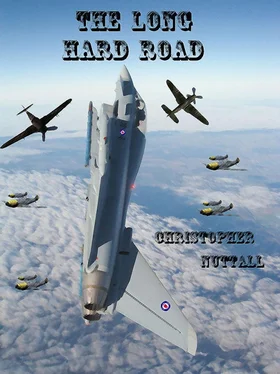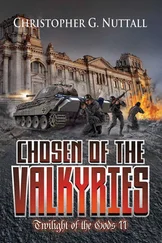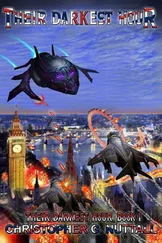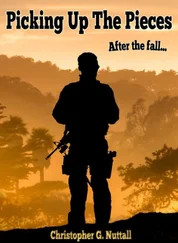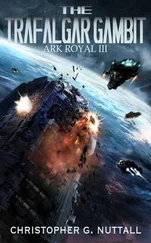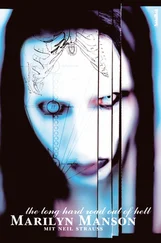He smiled. Duchamp’s reaction to discovering that France was being treated as an enemy state – which it had been for three years – had been highly amusing. The Frenchman had screamed about injustice and an ‘Anglo-American plot’ to hold the French back, knowing all the while that it was futile. The French had nearly torn themselves apart; separatist forces were at work within the new republic already.
At least they won’t have to worry about fighting an Algerian War , Hanover thought. None of the European powers would have to worry about that, with the possible exception of Belgium. For some reason known only to Adolf Hitler – and therefore utterly incomprehensible to a normal man – they had been permitted to keep their large state in Africa. The Congo might well see the chaos that South Africa would prevent from happening in the rest of Sub-Saharan Africa; the Smuts government had practically taken over the British colonies, once the war had ended.
“At least the Spanish decided to be reasonable,” Hanover said to himself. The Spanish had overthrown Franco as soon as Germany fell, and Portugal had followed with its director the week afterwards. Neither of them required intervention; they just required economic support to survive. The war had devastated large parts of Europe; Poland was pretty much on the verge of being destroyed as an independent nation, or even as a nation at all. Many of the German settlers were refusing to leave, or were taking passage to South Africa, along with a lot of people Hanover would have preferred to have seen in jail, or in front of a firing squad. The Balkans… well, even a hard-core German occupation, followed by a Turkish grab for the Muslim lands, hadn’t stopped them from fighting each other.
There was a knock at the door. “Come in,” Hanover snapped, and nodded politely to Professor Horton. He’d deliberately delayed the professor’s return to England, just so he could decide what to do about him, but now it didn’t matter. The excuse had rather run thin after a week, and he’d allowed him to return, but Horton had agreed to assist the Allied Commission on determining the peace terms.
“Prime Minister,” Horton said. The black man moved slowly, deliberately, his body still not recovered from its treatment by the Nazis in the final days in the Berlin bunker. “The formal reading of the treaty is in two hours.”
Hanover felt a flicker of impatience. The treaty had been privately agreed to by all of the defeated nations; it gave them a great deal in exchange for peace. He knew that there had been people in both of the major powers who had wanted to crush Europe and Russia, to say nothing of their attitude towards Japan, but they hadn’t won the day. A peace – even one that wasn’t perfect – was better than sowing the seeds for World War Three, particularly seeing that there would be no Cold War in this timeline.
Unless we get into one with America , Hanover thought, and dismissed the thought. The two powers were working together on almost every field now, and they had agreed spheres of influence; Asia and Africa for the British, except Siberia and China. Latin America for the Americans, except Guiana. Hanover knew that certain imperialists in the House of Commons – it hadn’t taken much to bring them out of the shadows – had been angry at giving the Americans so much, but Hanover wasn’t concerned.
“The Americans can bring democracy to those regions,” he said, and he had meant it. The British would do the same for Africa and India; the provisional Indian government had finally managed to agree on a power-sharing agreement that left the princes with enough to live on, while keeping the power in the hands of the Indian House of Commons. It wasn’t a perfect arrangement – and India’s sudden addition of Burma and Tibet to its system might be sowing trouble for the future – but it was infinitively better than what had gone before.
“Prime Minister, what will happen to Himmler?” Horton asked. “Where will he go?”
“The hangman,” Hanover said. The Allied War Crimes Commission hadn’t had any difficulties in bringing charges against Himmler; some of the accusations had been thought to be only theoretically possible. The charges that could be proven – the counts of organising the extermination of thousands of Jews, Poles and others – had been enough to have him sentenced to death. Along with Mengele and several hundred other high-ranking SS officers, Himmler would be hung soon enough.
“Good,” Horton said. He seemed to have something else to say, but didn’t say it. “Will the treaty hold?”
Hanover shrugged. “It should,” he said. “At least, we’ll be able to give democracy twenty – thirty – years to take root, without the threat of a Soviet invasion. We can do it better this time.” He smiled. “Now, what do you want to ask me?”
Horton didn’t have the grace to look surprised. “I want to talk to Himmler before you hang him,” he said. “Can you arrange that for me?”
Hanover lifted an eyebrow. “Why?”
“I want to ask him a few questions,” Horton said. “I need to ask him what the hell he was thinking.”
Hanover considered. Horton wasn’t a David Irving clone; he had faced Himmler and Hitler directly. “Very well,” he said finally. “Very well; you may visit him before he dies.”
* * *
Erwin Rommel, who had given up the title of General to become the Chancellor of the new Germany, took his seat in the conference room. His aide, Jagar, took a seat next to him, and then allowed Ambassador Schulze to slip past him to sit on the other side of Rommel. The representative from Russia – Ambassador Molotov – took his seat and nodded gravely to the Germans. The French, Spanish and Italians, small fry compared to the two major axis powers, took their seats. Some of them glared at the Germans; others maintained a steely silence.
Japan wasn’t represented. The Allied powers had decided, given that Japan had already surrendered, that they could be spared the humiliation of facing their judges. The Japanese were suffering badly, but they at least had been spared the task of reconstructing after a land war and two nuclear detonations.
The Polish delegation entered, taking a seat at the back. They glared at the Germans and Russians, who had slaughtered large numbers of their people. If the Germans had concentrated on extermination, rather than enslavement, the Poles would be extinct by now; ironically, the Holocaust had been worse in the other shadowy timeline.
So was the peace , Rommel said. He knew the peace terms, as did Molotov, and he knew that they were mild – far milder than Germany deserved. It was going to be bad, but perhaps a new Germany would arise from the ashes of the old, one strong, proud and democratic.
“Thank you all for coming,” McLachlan, the British Foreign Minister and the senior member of the negotiating team, said. Rommel smiled ruefully; it wasn’t as if anyone here had had a choice. “This is the result of nearly a month of arguing and compromising. The choice you gentlemen face is simple; you may accept the terms as they stand, or go back to war.”
There was a long pause. No one spoke. “First, all Axis countries, the major powers and the minor powers, will disarm in accordance with the protocols; no navy and a limited army and air force. You will permanently renounce the use of nuclear, chemical and biological weapons and you will be forbidden to research, develop, or stockpile such weapons. During that time, an Allied army will be stationed on your territory, including inspectors to ensure that you keep your word.
“Second, all of the disputed territory, from the Polish Corridor to Alsace-Lorraine, will be settled by a democratic vote, held under Allied supervision. The vote will determine the fate of those countries, and the ODS alliance will support whatever the outcome. In addition, all of your colonies that were occupied during the war will become independent and able to choose their own fates, including Siberia, Ukraine and Belarus.
Читать дальше
